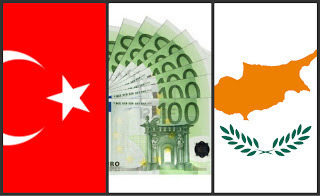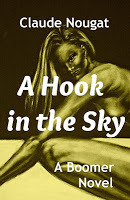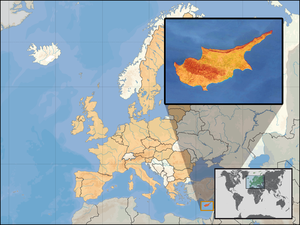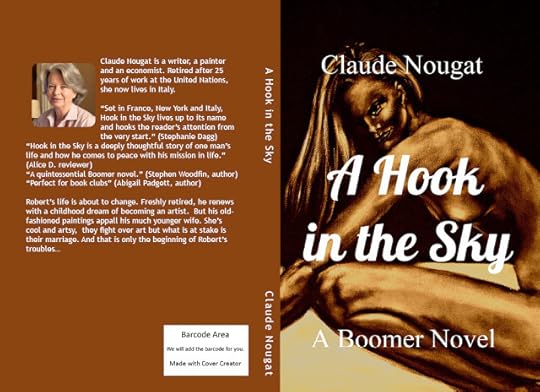Claude Forthomme's Blog, page 48
March 25, 2013
Cyprus: Euro Drama, Act Two?

The Euro crisis in Cyprus has taken a new turn after 12 hours of dramatic discussions that went on late into Sunday night among the main actors in the crisis, the Cyprus President, the Euro-zone finance ministers a.k.a. the Eurogroup, the EU Commission and the IMF. And all this drama was caused by the European Central Bank's threat to withdraw support to the Cypriot banking system starting this morning Monday 25 March.
So what happened? I blogged about the meaning of the crisis last week and now it's only fair that I give you an update. The New York Times reported this morning that "the deal would scrap the highly controversial idea of a tax on bank
deposits, although it would still require forced losses for depositors
and bondholders."
"Forced losses?" That's delicate diplomatic speak for saying that
(1) the second major bank in Cyprus, Laiki, will be wound down (read: closed, its employees laid off) and the first, The Bank of Cyprus, will be "restructured", absorbing Laiki's "good assets" and
(2) only deposits under €100,000 are left untouched (those are the ones legally insured, hence considered safe from any government levy in the Euro-zone). All the others are going to get hit, and if one is to believe gossip circulating this morning, they will get hit very hard: up to 30%. Yes, that's not a typo: thirty percent levy on deposits over €100,000.
Tough! Very tough on foreign deposits in Cypriot banks that are around half of a total €90 billion - of these some €20 billion are Russian. But we all saw last week that the Russian government doesn't appear to care much - presumably that money is largely illicit. Indeed, Cyprus has a sulphurous reputation internationally as both a financial turntable for fast money and a tax haven. Some €250 billion go through Cyprus every year to finance eat-west trade, especially with Russia and international corporations pay only a 10 percent tax here as opposed to 12.5% in Ireland - compare this to the over 29% tax in Germany and 33% tax in France and you get the idea.
However, when the Cypriot finance minister flew to Moscow to get aid, he got nothing. So far, the Russians have given a €2 billion loan to Cyprus to help it develop its huge offshore gas field and don't seem to want to get into a fight with the EU over Cyprus. It probably wants to keep its stake in the Cyprus gas reserves and there's every good reason to want to do so: after all, it is expected that Cyprus gas will be able to cover some 40% of the EU needs. Moreover the Turks have warned Cyprus not to use its gas reserves as collateral in any bailout deal since the Turkish part of Cyprus has as much claim to it as the part within the EU.
Yet IMF's Chief Christine Lagarde and the new head of the Eurogroup, the Dutch Finance Minister Jeroen Dijsselbloem, a close friend of Germany, both sounded relieved this morning in their respective press conferences, as if they had really solved the Cyprus problem. They touted this new deal as a victory, highlighting the fact that it left the original, highly controversial 16 March deal largely untouched. The ECB short-term lending to Cypriot banks will continue. And Cyprus will get, starting in May, the €10 billion bailout it needs to save its banking system from collapse and good weather has returned over the Euro-zone. It would seem that Asian markets this morning believed this was the case (they were all pointing up) and the Euro exchange rate was (relatively) stable.
Are the Cypriots happy? Hardly. The local press this morning highlighted that Cyprus was on its way down a road of suffering with austerity measures along the lines of those imposed on Ireland, Portugal, Spain and Italy, with no light at the end of the tunnel. You can't blame them, a lot of people are going to find themselves out of work, and not only at the Laiki bank that has to fold. It is clear that the Cypriot economy based on the island's peculiar financial role as a tax haven and financial turntable will be seriously damaged, and this for a long time.
Is it good for the Euro? Not really. Once again, we have the spectacle of Germany imposing its views on Europe with the staunch support of two countries in particular, the Netherlands and Finland. Germany makes €750 billion on its trade within the Euro-zone, you would expect it to feel a little more generous towards struggling Euro members. What happened to Cyprus is basically a replica of what happened in every other European country whose financial system went under water. As to the immediate cause of the Cypriot banking collapse - something Cyprus has suffered from since June of last year - , it is a knock-on effect from the Greek crisis. The Greek debt held by Cypriot banks went sour, it's as simple as that. One might perhaps add to it the effect of the world crisis in ship finance that began in 2008, though due to the lack of transparency in banking, it is hard to prove anything.
We are still dealing with the same systemic crisis.
And Germany's response is still the same. Angela Merkel is out to protect national taxpayers and never ceases talking about haircuts that banks must take. She knows how she has to act to get her votes when elections come up next September. Don't expect her to have a vision of Europe, she's only thinking of saving her job as Chancellor, full stop.
Does Cyprus matter to the rest of the world? On the face of it, not much, it's a small country of one million inhabitants with a GDP worth 0,2% of the Euro-zone. It's just one more tax haven that goes down the drain, and with it a few corrupt banks. Should you be happy over the clean-up? Yes and no. Because the crisis, remember, is systemic: the way it is handled by the European authorities (and the IMF) affects the Euro. Sure, exit of Cyprus out of the Euro-zone has been averted, but at what price?
The Euro is looking less credible, Europe is getting economically weaker...Is that good for the world?
Related articles
 Cyprus clinch last-ditch bailout deal(aljazeera.com)
Cyprus clinch last-ditch bailout deal(aljazeera.com) Eurogroup signs off on bailout agreement reached by Cyprus and troika(ekathimerini.com)
Eurogroup signs off on bailout agreement reached by Cyprus and troika(ekathimerini.com)

Published on March 25, 2013 03:06
March 22, 2013
Boomer Lit Friday: A Sneaky Peak at A Hook in the Sky
This is the fourth promised peak at A Hook in the Sky, a "quintessential boomer novel" as it has been called by several reviewers. For Amazon reviews (23), click here and Goodreads (20) are here.
This time, I thought I'd show you the sensual side of A Hook in the Sky. By now, if you follow this blog, you know the book is about Robert, a retiree-turned-artist to the dismay of his much younger wife. They fight, they separate, other women enter his life, and one in particular, called Nour. She is young, beautiful and deeply troubled. Since he's an artist, he paints her in the nude:

And here is the scene in the book describing Robert at work on her portrait:
For Robert, painting was
another way to make love to Nour.
On the canvas, his
brushes longingly caressed her breasts, her belly, her
thighs. He looked for the exact hue of her flesh, the shine of her hair falling
over her eyes. He arranged her in different pauses, multiplying the pleasure of
taking her in with his painter’s eyes. There was something slow and feline
about her, the way she crouched on the floor, all naked, and looked up at
him in defiance, like a cat.
He painted her in that crouching position and was certain it
was the best female nude he had ever done.
He loved her physically,
he loved her with his eyes. He had never loved a
woman so.
They rarely spoke to each
other, there was nothing to say. He never discovered what interested her, and
never understood what she saw in him – perhaps the charm of an older man?
Sneaky peak? Yeah! But I must confess: this is an abridged version, slightly sanitized for Web consumption. You get the real thing (a little steamier, oh yes) in the book!

For other fascinating Boomer lit reads, go to Boomer Lit Friday website where
authors participating in the Blog Hop have listed links to their own
site and boomer book. Have a happy Boomer lit week-end!
A HOOK IN THE SKY is available on Amazon, paperback (222 pages) and e-book : click here.

Related: Three Previous Peaks at A HOOK IN THE SKY and an article on Boomer lit in a major online magazine
 Discover Boomer lit in an Easy Fun Way every Friday(claudenougat.blogspot.com)
Discover Boomer lit in an Easy Fun Way every Friday(claudenougat.blogspot.com)
 Friday Boomer Lit: Another Peak at A HOOK IN THE SKY(claudenougat.blogspot.com)
Friday Boomer Lit: Another Peak at A HOOK IN THE SKY(claudenougat.blogspot.com)
 Friday Boomer Lit: Third Peak at A HOOK IN THE SKY(claudenougat.blogspot.com)
Friday Boomer Lit: Third Peak at A HOOK IN THE SKY(claudenougat.blogspot.com)
 Boomer Lit Featured on Major Publishing Industry Magazine(claudenougat.blogspot.com)
Boomer Lit Featured on Major Publishing Industry Magazine(claudenougat.blogspot.com)


This time, I thought I'd show you the sensual side of A Hook in the Sky. By now, if you follow this blog, you know the book is about Robert, a retiree-turned-artist to the dismay of his much younger wife. They fight, they separate, other women enter his life, and one in particular, called Nour. She is young, beautiful and deeply troubled. Since he's an artist, he paints her in the nude:

And here is the scene in the book describing Robert at work on her portrait:
For Robert, painting was
another way to make love to Nour.
On the canvas, his
brushes longingly caressed her breasts, her belly, her
thighs. He looked for the exact hue of her flesh, the shine of her hair falling
over her eyes. He arranged her in different pauses, multiplying the pleasure of
taking her in with his painter’s eyes. There was something slow and feline
about her, the way she crouched on the floor, all naked, and looked up at
him in defiance, like a cat.
He painted her in that crouching position and was certain it
was the best female nude he had ever done.
He loved her physically,
he loved her with his eyes. He had never loved a
woman so.
They rarely spoke to each
other, there was nothing to say. He never discovered what interested her, and
never understood what she saw in him – perhaps the charm of an older man?
Sneaky peak? Yeah! But I must confess: this is an abridged version, slightly sanitized for Web consumption. You get the real thing (a little steamier, oh yes) in the book!

For other fascinating Boomer lit reads, go to Boomer Lit Friday website where
authors participating in the Blog Hop have listed links to their own
site and boomer book. Have a happy Boomer lit week-end!
A HOOK IN THE SKY is available on Amazon, paperback (222 pages) and e-book : click here.

Related: Three Previous Peaks at A HOOK IN THE SKY and an article on Boomer lit in a major online magazine
 Discover Boomer lit in an Easy Fun Way every Friday(claudenougat.blogspot.com)
Discover Boomer lit in an Easy Fun Way every Friday(claudenougat.blogspot.com) Friday Boomer Lit: Another Peak at A HOOK IN THE SKY(claudenougat.blogspot.com)
Friday Boomer Lit: Another Peak at A HOOK IN THE SKY(claudenougat.blogspot.com) Friday Boomer Lit: Third Peak at A HOOK IN THE SKY(claudenougat.blogspot.com)
Friday Boomer Lit: Third Peak at A HOOK IN THE SKY(claudenougat.blogspot.com) Boomer Lit Featured on Major Publishing Industry Magazine(claudenougat.blogspot.com)
Boomer Lit Featured on Major Publishing Industry Magazine(claudenougat.blogspot.com)

Published on March 22, 2013 00:50
March 20, 2013
Why Boomer Lit Sells and What We Can Learn from a Boomer Best Seller
There are two reasons why Boomer lit is going to be the Next Big Genre:
(1) the potential size of the market
(2) the quality of the content.
The baby boomer market, as everyone knows, is huge: 77.5 million in the US alone, twice as much if you consider the rest of the world. It would seem to be a no-brainer to argue that a genre that puts boomers at the heart of the story should come out a winner.
Not so. Size is not enough. It's a necessary condition but not sufficient. More is needed.
Quality of writing is what's needed to make it a sure sell.
And quality is something Boomer lit has, no doubt about. By its very nature, because of the kind of stories it tells, Boomer lit attracts professional writers. These are people who know how to write, they have mastered all the different forms from novels to poetry and they are on top of all the writing techniques. In addition - and this is very important - they bring to their writing a lifetime of experience, memories that have enriched them and deepened their understanding of the human condition. They are often boomers themselves though not exclusively, the genre attracts younger talent too.
To illustrate my point, I'm going to take a look at a recent quintessential Boomer book that was long-listed for the Man Booker Prize (but didn't make it) yet was a global success and compare it to another global success, a Pulitzer Prize winner supported by the whole marketing power of Big Traditional Publishing (in this case Alfred A. Knopf). One is Rachel Joyce's The Unlikely Pilgrimage of Harold Fry and the other is Jennifer Egan's A Visit from the Goon Squad.

If you hop over to Amazon, you'll see Jennifer Egan's Goon Squad presented in bold letters as:
NATIONAL BESTSELLER
National Book Critics Circle Award Winner
PEN/Faulkner Award Finalist
A New York Times Book Review Best Book
One of the Best Books of the Year: Boston
Globe, Chicago Tribune, The Daily Beast, The Miami Herald, The
Minneapolis Star-Tribune, Newsday, NPR's On Point, O, the Oprah
Magazine, People, Publishers Weekly, Salon, San Francisco Chronicle,
Seattle Times, Slate, Time, The Washington Post, and Village Voice
Then you get a rousing two-line description: "Bennie is an aging former punk rocker and record executive. Sasha
is the passionate, troubled young woman he employs. Here Jennifer Egan
brilliantly reveals their pasts, along with the inner lives of a host of
other characters whose paths intersect with theirs. With music pulsing
on every page, A Visit from the Goon Squad is a startling, exhilarating novel of self-destruction and redemption."
How can you resist heart-thumping adjectives like "Jennifer Egan brilliantly reveals...blah blah", "music pulsing on every page", "a startling, exhilarating novel".
Wow! After that, what can one add?
Now go over to Rachel Joyce's Harold Fry page. You get a sober two-line book description: "When Harold Fry nips out one morning to post
a letter, leaving his wife hoovering upstairs, he has no idea that he
is about to walk from one end of the country to the other. He has no
hiking boots or map, let alone a compass, waterproof or mobile phone.
All he knows is that he must keep walking. To save someone else's life."
Here the tone is subdued, no excess, just the story in a few, well-chosen words.
This is followed by two simple comments:
'The odyssey of a simple man, original, subtle and touching'. - Claire Tomalin
'From the moment I met Harold Fry, I didn't want to leave him. Impossible to put down.' - Erica Wagner, The Times
Yes, that's it, nothing more.
Take a look now at how both books fare from the standpoint of the market, i.e. compare sales ranks and customer reviews.
In terms of Amazon Best Sellers rank, Harold Fry comes out ahead (rankings change over time but the difference here is so large that it clearly reflects a substantial difference in the level of sales):
Rank for The Unlikely Pilgrimage of Harold Fry:
#2,817 Paid in Kindle Store
#57
in Kindle Store > Kindle eBooks > Literature & Fiction > Genre Fiction > Family Life
#78
in Books > Literature & Fiction > Women's Fiction > Domestic Life
Rank for A Visit from the Goon Squad:
#4,630 Paid in Kindle Store
#25
in Kindle Store > Kindle eBooks > Literature & Fiction > Short Stories
#32
in Books > Literature & Fiction > Short Stories > Single Author
Let's note in passing how cleverly the classification has been made for The Goon Squad: it comes out looking better (lower) than the one done for Harold Fry, yet the overall paid-in-Kindle-Store ranking is much higher. Moreover, that classification is actually misleading: The Goon Squad is NOT a collection of short stories and attribution to a "single author" is clearly meaningless: there is only one Jennifer Egan!
The difference becomes much greater if you look at the customer reviews, keeping in mind that Rachel Joyce's book is, by comparison to The Good Squad, a newcomer to Amazon: Harold Fry was published on Amazon on March 15, 2012 and The Goon Squad a couple of years earlier, on June 8, 2010. Logically, the latter should have many more customer reviews than the former.
Yet, it's not the case, take a look at the number of customer reviews and ratings:
Number of Reviews for The Unlikely Pilgrimage of Harold Fry:
690 reviews,
average: 4.3 out of 5 stars
Number of Reviews for A Visit from the Goon Squad:
572 reviews,
average: 3.5 out of 5 stars
For The Goon Squad, the reviews are fewer (in spite of the longer time it's been up) and the average is lower.
Actually, a closer look at the reviews, relying on Amazon's system to highlight the three most common findings of reviewers, reveals what you already suspected. Customers really didn't like the book in spite of its being massively promoted by the Big Boys and reaping many national awards:
"And even the stories with the same characters in them didn't seem very connected" (Solanum/ 99 reviewers made a similar statement)
"I completely skipped the power point chapter just to finish this book and move on to more enjoyable reading." (Meredith Miller/ 100 reviewers made a similar statement)
"Seems like it is trying to be a bit too clever, and it didn't really work for me" (kiwireader/36 reviewers made a similar statement)
By contrast, Harold Fry got very strong and positive support:
"This is a wonderful first novel, the characters feel very real, such an unusual story and very well written" (Teresa Pietersen/130 reviewers made a similar statement)
"I found it very satisfying in the end." (L.N.Sims/ 69 reviewers made a similar statement)
"Harold isn't a character you can soon forget --and his journey of loyalty, redemption, friendship and love will stay with me for a long time." (Megan Snider/ 113 reviewers made a similar statement)
Clearly Harold Fry wins out, and I also made a review (see here) that flows in the same direction. Still, in my opinion, Jennifer Egan's book was very well written, perhaps over-written: one often got the impression that the author was exhibiting without restraint her (very real) talent for words. This of course annoyed a lot of readers (myself included) when all one wants from an author is a good read, not a display of literary pyrotechnics, including a chapter famously written in a PowerPoint style.
So, in spite of all the marketing propaganda, Jennifer Egan's book sank.
While Rachel Joyce's novel is rising.
What is extraordinary about Rachel Joyce's novel is not simply that it is an unusually successful debut novel. What is arresting is that it has achieved this phenomenal success in spite of dealing with issues of disease, retirement, suicide and death , not to mention that the two main characters (Harold Fry and his wife) are both boringly mature, run-of-the-mill and over-the-hill. In short, nothing here that would appear at first glance to have any sort of mass appeal. By contrast, Jennifer Egan's book is far less somber (though it too flirts with tragedy), has some exotic travel destinations like Italy and has several youngish characters, in particular Sasha, the "passionate, troubled young woman" of the book description, surely a character guaranteed to have mass appeal.
This shows that marketing gurus in the publishing industry didn't see the Boomer lit phenomenon coming. All the pizzazz around Jennifer Egan's book in 2011, the innovative writing (including PowerPoint!) couldn't save it. The market knows what it wants. And a large slice of the market - baby boomers - wants Boomer lit! A simple story about an "old man", retired and unremarkable like Harold Fry, can be inspiring and attract thousands, nay millions, of readers over time.
Now that's what makes Boomer lit a totally new phenomenon on the publishing scene, far more unexpected and meaningful than the success of erotic romance à la Fifty Shades of Grey - ok, we know it sold an astonishing 70 million copies and has over 18,000 customer reviews on Amazon, but, please note, with an average of only... 3.3 out of 5 stars! So quite a lot of people didn't like it. Besides, erotic romance is obviously pap for everyone (porn sells, nothing new here) and its success, if anything, is a testimony to the effectiveness of e-readers and other electronic devices in hiding the book cover from everyone around you. Nobody knows you are digging porn when you click shut that Kindle...


(1) the potential size of the market
(2) the quality of the content.
The baby boomer market, as everyone knows, is huge: 77.5 million in the US alone, twice as much if you consider the rest of the world. It would seem to be a no-brainer to argue that a genre that puts boomers at the heart of the story should come out a winner.
Not so. Size is not enough. It's a necessary condition but not sufficient. More is needed.
Quality of writing is what's needed to make it a sure sell.
And quality is something Boomer lit has, no doubt about. By its very nature, because of the kind of stories it tells, Boomer lit attracts professional writers. These are people who know how to write, they have mastered all the different forms from novels to poetry and they are on top of all the writing techniques. In addition - and this is very important - they bring to their writing a lifetime of experience, memories that have enriched them and deepened their understanding of the human condition. They are often boomers themselves though not exclusively, the genre attracts younger talent too.
To illustrate my point, I'm going to take a look at a recent quintessential Boomer book that was long-listed for the Man Booker Prize (but didn't make it) yet was a global success and compare it to another global success, a Pulitzer Prize winner supported by the whole marketing power of Big Traditional Publishing (in this case Alfred A. Knopf). One is Rachel Joyce's The Unlikely Pilgrimage of Harold Fry and the other is Jennifer Egan's A Visit from the Goon Squad.

If you hop over to Amazon, you'll see Jennifer Egan's Goon Squad presented in bold letters as:
NATIONAL BESTSELLER
National Book Critics Circle Award Winner
PEN/Faulkner Award Finalist
A New York Times Book Review Best Book
One of the Best Books of the Year: Boston
Globe, Chicago Tribune, The Daily Beast, The Miami Herald, The
Minneapolis Star-Tribune, Newsday, NPR's On Point, O, the Oprah
Magazine, People, Publishers Weekly, Salon, San Francisco Chronicle,
Seattle Times, Slate, Time, The Washington Post, and Village Voice
Then you get a rousing two-line description: "Bennie is an aging former punk rocker and record executive. Sasha
is the passionate, troubled young woman he employs. Here Jennifer Egan
brilliantly reveals their pasts, along with the inner lives of a host of
other characters whose paths intersect with theirs. With music pulsing
on every page, A Visit from the Goon Squad is a startling, exhilarating novel of self-destruction and redemption."
How can you resist heart-thumping adjectives like "Jennifer Egan brilliantly reveals...blah blah", "music pulsing on every page", "a startling, exhilarating novel".
Wow! After that, what can one add?
Now go over to Rachel Joyce's Harold Fry page. You get a sober two-line book description: "When Harold Fry nips out one morning to post
a letter, leaving his wife hoovering upstairs, he has no idea that he
is about to walk from one end of the country to the other. He has no
hiking boots or map, let alone a compass, waterproof or mobile phone.
All he knows is that he must keep walking. To save someone else's life."
Here the tone is subdued, no excess, just the story in a few, well-chosen words.
This is followed by two simple comments:
'The odyssey of a simple man, original, subtle and touching'. - Claire Tomalin
'From the moment I met Harold Fry, I didn't want to leave him. Impossible to put down.' - Erica Wagner, The Times
Yes, that's it, nothing more.
Take a look now at how both books fare from the standpoint of the market, i.e. compare sales ranks and customer reviews.
In terms of Amazon Best Sellers rank, Harold Fry comes out ahead (rankings change over time but the difference here is so large that it clearly reflects a substantial difference in the level of sales):
Rank for The Unlikely Pilgrimage of Harold Fry:
#2,817 Paid in Kindle Store
#57
in Kindle Store > Kindle eBooks > Literature & Fiction > Genre Fiction > Family Life
#78
in Books > Literature & Fiction > Women's Fiction > Domestic Life
Rank for A Visit from the Goon Squad:
#4,630 Paid in Kindle Store
#25
in Kindle Store > Kindle eBooks > Literature & Fiction > Short Stories
#32
in Books > Literature & Fiction > Short Stories > Single Author
Let's note in passing how cleverly the classification has been made for The Goon Squad: it comes out looking better (lower) than the one done for Harold Fry, yet the overall paid-in-Kindle-Store ranking is much higher. Moreover, that classification is actually misleading: The Goon Squad is NOT a collection of short stories and attribution to a "single author" is clearly meaningless: there is only one Jennifer Egan!
The difference becomes much greater if you look at the customer reviews, keeping in mind that Rachel Joyce's book is, by comparison to The Good Squad, a newcomer to Amazon: Harold Fry was published on Amazon on March 15, 2012 and The Goon Squad a couple of years earlier, on June 8, 2010. Logically, the latter should have many more customer reviews than the former.
Yet, it's not the case, take a look at the number of customer reviews and ratings:
Number of Reviews for The Unlikely Pilgrimage of Harold Fry:
690 reviews,
average: 4.3 out of 5 stars
Number of Reviews for A Visit from the Goon Squad:
572 reviews,
average: 3.5 out of 5 stars
For The Goon Squad, the reviews are fewer (in spite of the longer time it's been up) and the average is lower.
Actually, a closer look at the reviews, relying on Amazon's system to highlight the three most common findings of reviewers, reveals what you already suspected. Customers really didn't like the book in spite of its being massively promoted by the Big Boys and reaping many national awards:
"And even the stories with the same characters in them didn't seem very connected" (Solanum/ 99 reviewers made a similar statement)
"I completely skipped the power point chapter just to finish this book and move on to more enjoyable reading." (Meredith Miller/ 100 reviewers made a similar statement)
"Seems like it is trying to be a bit too clever, and it didn't really work for me" (kiwireader/36 reviewers made a similar statement)
By contrast, Harold Fry got very strong and positive support:
"This is a wonderful first novel, the characters feel very real, such an unusual story and very well written" (Teresa Pietersen/130 reviewers made a similar statement)
"I found it very satisfying in the end." (L.N.Sims/ 69 reviewers made a similar statement)
"Harold isn't a character you can soon forget --and his journey of loyalty, redemption, friendship and love will stay with me for a long time." (Megan Snider/ 113 reviewers made a similar statement)
Clearly Harold Fry wins out, and I also made a review (see here) that flows in the same direction. Still, in my opinion, Jennifer Egan's book was very well written, perhaps over-written: one often got the impression that the author was exhibiting without restraint her (very real) talent for words. This of course annoyed a lot of readers (myself included) when all one wants from an author is a good read, not a display of literary pyrotechnics, including a chapter famously written in a PowerPoint style.
So, in spite of all the marketing propaganda, Jennifer Egan's book sank.
While Rachel Joyce's novel is rising.
What is extraordinary about Rachel Joyce's novel is not simply that it is an unusually successful debut novel. What is arresting is that it has achieved this phenomenal success in spite of dealing with issues of disease, retirement, suicide and death , not to mention that the two main characters (Harold Fry and his wife) are both boringly mature, run-of-the-mill and over-the-hill. In short, nothing here that would appear at first glance to have any sort of mass appeal. By contrast, Jennifer Egan's book is far less somber (though it too flirts with tragedy), has some exotic travel destinations like Italy and has several youngish characters, in particular Sasha, the "passionate, troubled young woman" of the book description, surely a character guaranteed to have mass appeal.
This shows that marketing gurus in the publishing industry didn't see the Boomer lit phenomenon coming. All the pizzazz around Jennifer Egan's book in 2011, the innovative writing (including PowerPoint!) couldn't save it. The market knows what it wants. And a large slice of the market - baby boomers - wants Boomer lit! A simple story about an "old man", retired and unremarkable like Harold Fry, can be inspiring and attract thousands, nay millions, of readers over time.
Now that's what makes Boomer lit a totally new phenomenon on the publishing scene, far more unexpected and meaningful than the success of erotic romance à la Fifty Shades of Grey - ok, we know it sold an astonishing 70 million copies and has over 18,000 customer reviews on Amazon, but, please note, with an average of only... 3.3 out of 5 stars! So quite a lot of people didn't like it. Besides, erotic romance is obviously pap for everyone (porn sells, nothing new here) and its success, if anything, is a testimony to the effectiveness of e-readers and other electronic devices in hiding the book cover from everyone around you. Nobody knows you are digging porn when you click shut that Kindle...


Published on March 20, 2013 09:29
March 18, 2013
Bank Run in Cyprus? The Euro in Danger!

The $13 billion bailout proposed this weekend by the European Central Bank, the Euro-zone finance ministers and the IMF to save Cyprus from bankruptcy could lead to a bank run and the collapse of the banking system in Cyprus.
Should we worry? After all, Cyprus is a tiny island in the Mediterranean, much smaller than Greece, surely it couldn't put the Euro-zone in danger. What is at risk here is a mere €68 billion deposited in Cypriot banks (of which €19 billion is said to belong to foreigners) - surely peanuts compared to the vast sums sunk in Greece, Ireland, Portugal and Spain...
The answer is: this is not peanuts. The situation is highly dangerous for two reasons that have little to do with the size of the bailout:
(1) instead of asking bondholders to take a "hairline cut", the lenders this time - under pressure from Germany as usual - are asking bank depositors to take the brunt: accounts below €100,000 will be taxed 6.75%, and those above, fully 9.9%! Yes, you read that right. This means that about €5.8 billion of the bailout is going to come directly from depositors in Cyprus’s banks, in the form of what the EU has delicately termed an “upfront one-off stability levy”. A stability levy? What happens is that the authorities simply seize funds from private bank accounts and in doing so, they are putting in jeopardy the whole banking system!
You thought your savings were safe in a bank? Think again! Not surprisingly, within 24 hours, the cash machines on the island were empty as people scrambled to save their money. Electronic transfers were stopped.
This is by far the most dangerous and irresponsible move by any modern, democratic government - a government is supposed to protect its citizens and not steal from them. Furthermore, the fact that it has been imposed on Cyprus by the Euro-zone authorities makes it truly scandalous.
(2) the decision, as was pointed out by commentators here in Italy goes counter to the European Union treaties, in particular article 56 and 60 that establish the free circulation of capital: the Euro-group ministers of finance seem to have forgotten that taxing bank accounts is tantamount to rescinding one of the basic tenets of the European Union.
What constantly amazes me is how stupid our political class is. Everybody with a minimum of common sense can understand that you Do. Not. Adopt. Austerity. Measures in times of recession. Likewise, you Do. Not. Tax. Bank. Accounts to finance international bailouts. Elementary, my dear Watson.
But this is of course yet another dose of the German Central Bank's medicine, obviously concocted by its president, Mr. Jens Weidmann, a rigorous monetarist à la George Osborne , though he is different from him in that he hasn't attended a top university and he has acquired some bizarre experience (e.g. a stint in Rwanda) that would seem to ill prepare him for the management of the Euro. Alas he's got the support of dear Angela Merkel and since he runs the biggest central bank in the Euro-zone he can force the European Central Bank to follow his diktats.

Dr. Jens Weidmann, President of the Deutsche Bundesbank
In the meantime, everyone in Southern Europe suffers. Cypriot citizens are understandably furious. On television, they are
all saying the same thing: "if that's Europe, what are we doing here? We
don't want to be Europeans in this kind of Europe!"
Right.
You can't blame them. And on the blogosphere (take a peak at the articles listed below), the panic is spreading like wildfire.
Mr. Weidmann, is that what you want? Don't you realize that every time you impose austerity and unfair taxes on Euro-zone members that you deem deviant, you are punching holes in the Euro boat? Your demands have caused a depression in Greece the likes of which Greeks had never experienced in their lifetime. And now it's the turn of Italy because your friend Mario Monti dutifully followed your recipes to the applause of European politicians that understand nothing about economics. Italy is under water, unemployment hasn't been this high in a decade, businesses are failing, even the real estate market that had escaped a Spanish style inflationary bubble is collapsing, with sales volume down by 30%, the lowest level since 1985.
And we are not speaking of Cyprus here, but of the third larges economy in the Euro-zone, after Germany and France.
Mr. Weidmann, the Euro boat is sinking but remember you're on it too. You may be at the helm, but the boat is sinking, is that what you really want? This morning, as I write, the markets are set to react and I don't think anyone will like what they see.
BREAKING NEWS: The Cyprus parliament just voted against the Bank Deposit tax (March 19). Click here for the New York Times article on the subject.
Related articles
 Bailout terms prompt run on Cyprus banks(aljazeera.com)
Bailout terms prompt run on Cyprus banks(aljazeera.com) This Crazy Cyprus Deal Could Screw Up A Lot More Than Cyprus...(businessinsider.com)
This Crazy Cyprus Deal Could Screw Up A Lot More Than Cyprus...(businessinsider.com) The Cyprus precedent(blogs.reuters.com)
The Cyprus precedent(blogs.reuters.com) Get Ready For Bank Runs ... Withdraw Your Money Now ... Interest Rates Suck Anyway(youviewed.com)
Get Ready For Bank Runs ... Withdraw Your Money Now ... Interest Rates Suck Anyway(youviewed.com) Euro Minister Doesn't Rule Out Taxes on Bank Deposits Beyond Cyprus(economicpolicyjournal.com)
Euro Minister Doesn't Rule Out Taxes on Bank Deposits Beyond Cyprus(economicpolicyjournal.com) Cyprus Bank Holiday extended until wednesday ...to stop runs on the Cyprus Banks(planet.infowars.com)
Cyprus Bank Holiday extended until wednesday ...to stop runs on the Cyprus Banks(planet.infowars.com) Cyprus Nails DEPOSITORS?!(fedupusa.org)
Cyprus Nails DEPOSITORS?!(fedupusa.org) Markets set to react over Cyprus(bbc.co.uk)
Markets set to react over Cyprus(bbc.co.uk) Schaeuble says decision to tax small deposits was taken by Cyprus, European Commission and ECB(ekathimerini.com)
Schaeuble says decision to tax small deposits was taken by Cyprus, European Commission and ECB(ekathimerini.com)

Published on March 18, 2013 01:28
March 14, 2013
Friday Boomer Lit: Third Peak at A HOOK IN THE SKY

Angered by his wife,
Robert damages his work
This is the third Friday you get a peak at A HOOK IN THE SKY. There
will be another chance next week, then I shall stop this particular music and start with another! Once
you're finished here, I urge you to take a look at the snippets
posted by other Boomer Lit authors on their blogs: you'll find the links listed on the Boomer Lit Friday website. And you'll discover what are enduring features of Boomer lit: a broad range of sub-genres and high quality writing. Don't be surprised, it is a genre that attracts experienced and professional writers...
A HOOK IN THE SKY is a "slice-of-life" novel, the story of a retiree-turned-artist to the dismay of his much younger wife and they fight over art. Robert's tastes run to the academic, Kay is cool and loves contemporary art. What is really at stake is their marriage. When his old mother, a painter of the 1930s School of Paris, comes over to New York to stay with the couple, she has her own say in the matter.
Here's today's excerpt, a dialogue between Robert and his mother just as Robert feels caught between the two women:
"...This is very serious, Robert.
I’m your mother, remember? I can see what’s happening to your marriage. You’re
allowing your wife to convince you that what you do is worthless.”
“Nonsense. Kay’s tastes
are different from yours and mine. That’s all.”
“Oh, but it’s not just a
matter of taste! The problems between you run much deeper than that! I’m an old
woman, I have experience. I see what I see…”
“In that case, just keep
your eyes shut, will you?”
Her eyes widened as if
she wanted to convey something important and didn’t know how. Then she did
something very theatrical. She plunged to the floor, taking hold of his ankle.
Crouching at his feet, she held his leg in both hands. “Now, try walking!” She
said.
“What do you mean?”
“Try walking, I tell you!
Come on, push that leg forward!”
He didn’t try hard, not
wanting to hurt her, but he felt his leg straining against her hands.
“See? You’re slowed down!
You can’t walk. That’s what Kay does to you!”
The next day she flew
back to Paris.
It was a relief to see
her go.
A Hook in the Sky available on Amazon, click here for more details.
Want to see the new book trailer? It's updated with the new book cover (based on my own artwork):


Published on March 14, 2013 23:39
Boomer Lit Featured on Major Publishing Industry Magazine

Facebook Page of Boomer Lit Goodreads Group
Boomer lit - the hot new genre aimed at boomers, a huge market with real purchasing power and time to read - is poised to go viral on Internet. A major industry publication, the online magazine Publishing Perspectives has just posted an article today with the telling title: IS BABY BOOMER LIT THE NEXT HOT GENRE?
Here are some excerpts:
Publishers might be making a mistake if they overlook the potentially
huge market of the aging. This is especially true when it comes to Baby
Boomers [...] Boomers are now
retiring at the rate of 3.5 million per year, that’s 10,000 per day.
They have time to read and they want books that cater to them
specifically...
...
Hollywood was the first to notice this opportunity. The number of films
featuring mature Boomers has increased exponentially in the past few
years and they have been (nearly) all box office successes, notably RED (Retired Extremely Dangerous), The King’s Speech, Something’s Gotta Give, It’s Complicated, The Descendants, Carnage, Flight, etc…Heck, even James Bond has gotten older and a little slower. Just think of the issues central in the latest film iteration Skyfall.
...
Some in publishing and bookselling may be unhappy at the idea of
having to deal with yet another genre and leery of what they see as
books focused on old age.[...]Boomers have already changed so much about the way they see the world
and they are now going to change the way people grapple with aging in
our society. Boomer Lit is going to be the vehicle of choice to express
this. A group has already been created to discuss Boomer Lit on Goodreads.
It has its own Facebook page and Twitter account. Within three months
of being established, the group attracted some 240 members who listed
some 70 Boomer book titles on its bookshelf.
...
So, why should publishers really care? Maybe they sell enough books
already? The fact is that there is ample proof that the Boomer Lit genre
is selling and was selling even before it had a name.[...]
Why is Boomer lit emerging now? Many factors have contributed to making 2013 a “magic” year for the birth of this new genre.
First: the Internet accelerates such changes. A few years ago, the
appearance of a novel like Rachel Joyce’s might have passed unnoticed;
today, thanks to the digital revolution, it resonates with masses of
readers and writers: on Amazon it has earned over 644 customer reviews
and on Goodreads an amazing 14,105 ratings and 3,378 reviews.
Second, the changing demographics. As I mentioned earlier, Boomers are
now retiring at the rate of 3.5 million per year, that’s 10,000 per day.
Inevitably, this translates in a change in culture and society’s
interests.
...
Third, the marketing industry has also awakening to the need to restructure its marketing strategies and re-focus on Boomers. [...] As Matt Thornhill, one of the two authors of the [ "Boomer Consumer" marketing guide] told the Miami Herald,
to think that Boomers will go into retirement lying low and spending
less is undoubtedly a mistake: they will spend at “Boomer levels.”
And they will buy books, provided they have stories of concern to them.
Under the circumstances, it is no surprise that Boomer Lit should be
the Next Big Genre. The first among major publishers to set up an
imprint focused on Boomers is likely to find he’s come up with a winner…
To read the full article, click here
What is your take? Anything to add to the reasons why Boomer lit is emerging now?
Related articles
 Boomer Lit is Live on Facebook!(claudenougat.blogspot.com)
Boomer Lit is Live on Facebook!(claudenougat.blogspot.com) My Take on Boomer Lit(joanneguidoccio.com)
My Take on Boomer Lit(joanneguidoccio.com)

Published on March 14, 2013 04:27
March 13, 2013
Baby Boomers Less Likely to be Obese?

This is a counter-intuitive finding: Americans born after World War II - between 1946 and 1964 - are less likely to develop "abdominal obesity" than either the previous generation (the so-called Silent Generation) or the following one (the X Generation).
This was the surprising result of a recent study by Dr. Whitney Robinson of University of North Carolina’s Gillings School
of Global Public Health and her colleagues using data from the
National Health and Nutrition Examination Survey (NHANES). It was reported by Arti Virkud, a Columbia University Med student on the 2X2 Project who suggested that the explanation might lie in Baby Boomers' lifestyle.
As she writes: " Baby Boomers have been less exposed to factors that are linked to
obesity, such as psychosocial and socioeconomic stress. The prosperity
of the post-World War II U.S. may be a contributor to the reduced levels
of stress. The effect was considerably higher in women in the Baby
Boomer group than men in the same group."
Women are more concerned about their figure than men, nothing new here. Yet the finding is a little strange: medical studies show that women are normally the fatter sex for biological reasons (more body fat: 25% for women as against 15% for men; female hormones convert fat more easily; birth control pills have a fattening effect). So if boomer women show less tendency to fat than boomer men, it comes as a real surprise.
The other surprise is the suggestion that post World War II prosperity has been a major stress-reducing factor for boomers. In my view, this is difficult to believe. The period when boomers reached adulthood, starting in the 1970s, certainly wasn't a time of prosperity but of major economic upheaval: oil prices were multiplied, the dollar went off the gold exchange standard, economic regulations were loosened and there was a huge shift to an unregulated market (the so-called Washington consensus). Those were the years when income inequality and the famous one percent recently decried by Occupy Wall Street took off. Those were the years when Wall Street went through scary ups and downs: apart from technical hiccups, there was the bursting of the 2001 technology bubble, the so-called dot.com burst, and then the 2008 Big Recession.
Not to mention 9/11 and the war on terrorism.
Hardly a stress-free time for boomers, many of whom lost their job, couldn't sell their business when they wanted to and had to postpone retirement.
So what is it that makes the boomer generation thinner?
One possibility is that the boomer generation is largely responsible for society's fixation on remaining young and looking young. In the 1950s, opinion setters were the elderly. That changed in the 1960s with the huge wave of boomers getting a university education - many more than ever before. As a result boomers began to call the shots and set public opinion, on human rights, feminism, the ecology and more. They, and not the elderly, became the opinion setters. And of course, they were young!
Young was beautiful. Young was cool.
As they matured into adulthood, a whole industry sprang up around boomers to help them keep their youthful looks and stay cool, from special creams to plastic surgery. Staying thin, watching one's figure, going on diets has become a leitmotiv of boomer living styles. Doubt it? The latest evidence of boomers' eating habits, coming from a research in Australia, shows that their food preferences (soups, salads) are the healhiest of all generations.
My personal view on all this is that the time has come for boomers to take a step back and consider the transition to the next stage in their lives. This is where literature has a role to play to help those boomers who are prone to meditate and consider their next steps. This is what Boomer lit is all about.
For me, literature is not just there for entertainment. It's also a (fun) way for society to ask itself some hard questions about pressing issues. In particular,how boomers intend to address aging. This is an inevitable stage in life for boomers who now find themselves sandwiched between the younger generation, many of whom are still looking for a job or looking again, and the older generation that is now entering their last act in life, not the Third Act but the Fourth. And the Fourth Act is where the physical problems accumulate and help is needed...
Not an easy time for boomers! This is why I'm convinced Boomer lit has a special role to play, just like YA lit did when boomers left their teen years behind and had to face adulthood back in the 1960s and 70s - a guiding role for a literature that asks questions and (sometimes) provides answers. Perhaps the most interesting aspect is that special position boomers find themselves in, as they are "sandwiched-between-generations". It is certainly the source and inspiration for really good stories, both in literature and in films - notably a movie like The Descendants depicting a father facing the loss of a spouse and caught between his rebellious daughters and an inescapable family heritage. If you haven't seen it, here's the movie trailer, it's a film you don't want to miss:
What is interesting though is the idea that one can learn more from epidemiological studies that compare health based on the generation people were born into than from the usual standard studies that consider the population as a whole. It is undeniable that so far the latter have often come up with hard-to-believe resuls. Notably the study that told us a month ago that boomers are aging poorly and are in worse health than their parents (see articles below, there were several, the news flew around the Net, no doubt to the glee of the other generations...).
The trouble is: this is neither convincing as an argument nor a particularly useful way to look at it. It is clear that their parents who have survived to an older age are the stronger ones, those who have overcome the threats of early cancer, diabetes, Alzheimer's etc. By contrast, most boomers still haven't died, not even those in poor health have gone...So overall, it is only natural that boomers' health should appear poorer than that of the (few) surviving elders! No, clearly the way to go about this is to consider and compare generations at the same age: we won't really know whether boomers are aging poorly and dying sooner than their parents until they have reached the same age as their parents!
So studies that look in depth at a single generation are welcome. An approach that I hope scientists will pursue so they can finally tell us what is so special about boomers. And, as Ellen Jacob mentioned in her excellent article on Examiner.com, the "times, they are a-changing especially for baby boomers": an estimated 20,000 boomers will retire each day over the next twenty years. Get ready for a retiree tsunami!
Scientists should examine what the impact of this change in boomers' lives will have on society. Unless we writers do it before them with Boomer lit...I'm not kidding! I know Science and Literature play different roles in society, but they could (and sometimes are) complementary, why not? What's your take, what role do you see for Boomer lit?
Related articles
 My Take on Boomer Lit(joanneguidoccio.com)
My Take on Boomer Lit(joanneguidoccio.com) Boomers, Gen Xers more entrepreneurial; Gen Y more intrapreneurial(jenx67.com)
Boomers, Gen Xers more entrepreneurial; Gen Y more intrapreneurial(jenx67.com) Aging Poorly: Another Act Of Baby Boomer Rebellion(pattidudek.typepad.com)
Aging Poorly: Another Act Of Baby Boomer Rebellion(pattidudek.typepad.com) Baby Boomers: Live Longer, But Not Healthier(medicalnewstoday.com)
Baby Boomers: Live Longer, But Not Healthier(medicalnewstoday.com) Times they are a-changing especially for baby boomers(examiner.com)
Times they are a-changing especially for baby boomers(examiner.com)

Published on March 13, 2013 07:22
March 11, 2013
Is Amazon Failing to Report Book Sales?
Urgently re-posting the news: evidence that Amazon may be failing to report book sales correctly. Warning: I personally have not noticed anything amiss in my book sales reports.
I have no evidence that something like this is actually going on. But that such
reports circulate on Internet, apparently providing convincing facts, is
surely a matter for concern.
This article first came out last year on author Jeanette Vaughan's blog:
September 28, 2012
Do Amazon and Createspace rip off Indie publishers with failure to correctly report sales?
Guest post by John. R. Clark, Managing Editor at AgeView Press
When AgeView Press Indie pubbed the book FLYING SOLO in
May of 2012, the author, Jeanette Vaughan immediately began tracking
sales. She heard from excited friends and family who immediately
emailed when ordering their copies. The first sales were off of Createspace’s e-store with
the title ID number given to the author. Then, through Amazon, a week
later, when the book went live on the site. Finally on Kindle, when
the ebook format was completed.

Where, oh where are my royalties?
...
Initially, things appeared kosher. People exclaiming that they had
ordered the book, were showing up within a day or two on the electronic
royalty reports with a reasonable accuracy. But by June and July,
sales discrepancies were noted by the author from customers claiming
that they had purchased the book directly through Amazon, not an Amazon
affiliate. Many of these sales were simply not listed.
...
The first note of apparent discrepancy came when a dear friend of the
author ordered three copies of the book from Amazon in June. These
books were ordered all at the same time, from Amazon.com direct. Yet,
that cluster of three sales was never posted as such. Another
instance in early July involved the same issue. Again, a customer
ordered three copies, yet no sales were trackable through Amazons
channels for three sale purchased on the same day.
...
Meantime, the author was making public appearances, being featured
on blogs and radio, and rounding with book signings. During the months
of June and July, no expanded distribution channel sales were posted on
the royalty report, yet customers were emailing the author letting her
know how much the book was being enjoyed overseas. More than 15 five star reviews for the novel were posted on Amazon.
What should have shown as a surge of sales, as the book peaked, never
appeared on the royalty reports.
...
By August, it was clear there were gross in accuracies. The 30 copies ordered from Barnes and Noble never
showed up. Few if any sales were listed for August. Yet the author
had confirmation of over 4,000 copies in distribution worldwide. The
crowning blow came in September. A plan was devised. A friend,
agreed to help with the investigation. She ordered a copy of FLYING
SOLO on September 7th, taking screen shots of her order and confirmation
of payment directly from Amazon. She printed out here receipt
showing date and time of purchase. The book arrived on September 13,
to San Jose, California. Photos were taken. The sale was
complete. Copies of all screenshots and receipts were scanned and
sent to the author. By September 20th, no sales were shown at all on
Createspaces report. Phoning Createspace, the author was informed
that no sales were showing for Amazon for the month for that title.
...
What options does that leave the Indie
publishers? How can they possibly track the success of their
marketing efforts. Is the publishing world doomed to be controlled by
the big six?
...
Rise up Indie authors! Repost this story! Tweet it,
facebook it. Make it go viral. Print it and send it to your local
newspaper and the Associated Press. This abject fraud is outrageous and MUST STOP!
John R. Clark, Managing Editor, AgeView Press
For the full story, go here.


I have no evidence that something like this is actually going on. But that such
reports circulate on Internet, apparently providing convincing facts, is
surely a matter for concern.
This article first came out last year on author Jeanette Vaughan's blog:
September 28, 2012
Do Amazon and Createspace rip off Indie publishers with failure to correctly report sales?
Guest post by John. R. Clark, Managing Editor at AgeView Press
When AgeView Press Indie pubbed the book FLYING SOLO in
May of 2012, the author, Jeanette Vaughan immediately began tracking
sales. She heard from excited friends and family who immediately
emailed when ordering their copies. The first sales were off of Createspace’s e-store with
the title ID number given to the author. Then, through Amazon, a week
later, when the book went live on the site. Finally on Kindle, when
the ebook format was completed.

Where, oh where are my royalties?
...
Initially, things appeared kosher. People exclaiming that they had
ordered the book, were showing up within a day or two on the electronic
royalty reports with a reasonable accuracy. But by June and July,
sales discrepancies were noted by the author from customers claiming
that they had purchased the book directly through Amazon, not an Amazon
affiliate. Many of these sales were simply not listed.
...
The first note of apparent discrepancy came when a dear friend of the
author ordered three copies of the book from Amazon in June. These
books were ordered all at the same time, from Amazon.com direct. Yet,
that cluster of three sales was never posted as such. Another
instance in early July involved the same issue. Again, a customer
ordered three copies, yet no sales were trackable through Amazons
channels for three sale purchased on the same day.
...
Meantime, the author was making public appearances, being featured
on blogs and radio, and rounding with book signings. During the months
of June and July, no expanded distribution channel sales were posted on
the royalty report, yet customers were emailing the author letting her
know how much the book was being enjoyed overseas. More than 15 five star reviews for the novel were posted on Amazon.
What should have shown as a surge of sales, as the book peaked, never
appeared on the royalty reports.
...
By August, it was clear there were gross in accuracies. The 30 copies ordered from Barnes and Noble never
showed up. Few if any sales were listed for August. Yet the author
had confirmation of over 4,000 copies in distribution worldwide. The
crowning blow came in September. A plan was devised. A friend,
agreed to help with the investigation. She ordered a copy of FLYING
SOLO on September 7th, taking screen shots of her order and confirmation
of payment directly from Amazon. She printed out here receipt
showing date and time of purchase. The book arrived on September 13,
to San Jose, California. Photos were taken. The sale was
complete. Copies of all screenshots and receipts were scanned and
sent to the author. By September 20th, no sales were shown at all on
Createspaces report. Phoning Createspace, the author was informed
that no sales were showing for Amazon for the month for that title.
...
What options does that leave the Indie
publishers? How can they possibly track the success of their
marketing efforts. Is the publishing world doomed to be controlled by
the big six?
...
Rise up Indie authors! Repost this story! Tweet it,
facebook it. Make it go viral. Print it and send it to your local
newspaper and the Associated Press. This abject fraud is outrageous and MUST STOP!
John R. Clark, Managing Editor, AgeView Press
For the full story, go here.


Published on March 11, 2013 07:56
March 7, 2013
Friday Boomer Lit: Another Peak at A HOOK IN THE SKY
As promised, this is another peak at A HOOK IN THE SKY - and again, I urge you, once you're finished here to take a look at the snippets posted by other Boomer authors on their blog: you'll find the links to their blogs listed on the Boomer Lit Friday blog. And I bet you'll be amazed at the variety of writing. This should come as no surprise: Boomer lit, being an audience-centric genre like YA lit, spans across most theme-related genres like romance and thrillers.

One of Robert's paintings, titled Spillover
My book, A HOOK IN THE SKY, could be termed a "slice of life" novel about a retiree-turned-artist. It tells the story of a dashing Frenchman named Robert, who upon retiring from his top level job at the UN, decides to renew with his childhood dream of becoming an artist. He has learned painting from his mother, a School of Paris artist who had her moment of fame back in the 1930s, and his paintings tend to the figural and academic, much to the dismay of his wife Kay who loves contemporary art (she runs an art gallery in Chelsea).
His mother, now widowed and an old lady in her 80s, lives in Paris but upon hearing that he has taken up painting, comes to visit her son in New York, excited at the idea that he is following in her footsteps. She's amazed to discover that Kay, his wife, has shown no desire to see Robert's work. Here's this Friday's peak:
When his mother was fixated on
something, she wouldn’t give up. “Kay could be of great use to you and point
the way to what sells here in America” she said. “You know, in art as in
everything else, it’s a question of marketing. Knowing what people want.”
The next morning she cornered Kay
before breakfast. She forced her to ‘come and view’ his latest paintings. Kay
arched an eyebrow and followed her into his studio. Robert remained in the
kitchen nursing his coffee, in no mood to see Kay’s reaction.
Within minutes they were both back,
looking somber. Kay was silent and aloof through breakfast, his mother got
progressively angrier.
“Well, why don’t you tell him
something!” she exploded.
Robert tried to defuse the
situation. “Kay has no wish to say anything, and it’s much better like this!”
His mother glowered and marched out,
her white hair bobbing. She slammed the door of the kitchen, an unexpected
gesture for such a minute, prim lady.

This is the book cover for the paperback (by Create Space) - based on my own art work. Do you like it?
Both e-book and paperback available on Amazon, click here.
PS: Just as I was posting this I realized today is March 8, Women's Day . What could be a better way to celebrate women than to publish this snippet which clearly shows the power of the two most formidable women in Robert's life, his mother and his wife?



One of Robert's paintings, titled Spillover
My book, A HOOK IN THE SKY, could be termed a "slice of life" novel about a retiree-turned-artist. It tells the story of a dashing Frenchman named Robert, who upon retiring from his top level job at the UN, decides to renew with his childhood dream of becoming an artist. He has learned painting from his mother, a School of Paris artist who had her moment of fame back in the 1930s, and his paintings tend to the figural and academic, much to the dismay of his wife Kay who loves contemporary art (she runs an art gallery in Chelsea).
His mother, now widowed and an old lady in her 80s, lives in Paris but upon hearing that he has taken up painting, comes to visit her son in New York, excited at the idea that he is following in her footsteps. She's amazed to discover that Kay, his wife, has shown no desire to see Robert's work. Here's this Friday's peak:
When his mother was fixated on
something, she wouldn’t give up. “Kay could be of great use to you and point
the way to what sells here in America” she said. “You know, in art as in
everything else, it’s a question of marketing. Knowing what people want.”
The next morning she cornered Kay
before breakfast. She forced her to ‘come and view’ his latest paintings. Kay
arched an eyebrow and followed her into his studio. Robert remained in the
kitchen nursing his coffee, in no mood to see Kay’s reaction.
Within minutes they were both back,
looking somber. Kay was silent and aloof through breakfast, his mother got
progressively angrier.
“Well, why don’t you tell him
something!” she exploded.
Robert tried to defuse the
situation. “Kay has no wish to say anything, and it’s much better like this!”
His mother glowered and marched out,
her white hair bobbing. She slammed the door of the kitchen, an unexpected
gesture for such a minute, prim lady.

This is the book cover for the paperback (by Create Space) - based on my own art work. Do you like it?
Both e-book and paperback available on Amazon, click here.
PS: Just as I was posting this I realized today is March 8, Women's Day . What could be a better way to celebrate women than to publish this snippet which clearly shows the power of the two most formidable women in Robert's life, his mother and his wife?


Published on March 07, 2013 23:16
March 6, 2013
What Nobody Tells You About Austerity and Budget Deficits
Finally the secret is out: the International Monetary Fund (IMF) made a major mistake in its calculations and discovered - surprise, surprise - that austerity measures hurt an economy in recession! The news have reverberated in the press in Europe - I'm still waiting for the New York Times to catch up (unless it's hidden in some back page, please let me know - but it certainly hasn't been a featured article).
Why is the New York Times mum about this? Probably because it's hard to budge deep-seated convictions that budget rectitude is good - indeed, the word "rectitude" tells it all. Journalists and politicians keep mistaking balancing the government budget with balancing the family budget. What's good and right for a family isn't good and right for a country. I've posted about this many times before and won't go into it now. Suffice to say that balancing a state budget is something you should do over a business cycle (i.e. several years) and not over a single year or two. And you should use the government's budget as a countervailing weight: when the economy is in recession, the state should lighten taxes and spend money to keep the economy going since recession is a result of businesses withdrawing from the market place. When boom times return is when the state should withdraw its presence from the market and seek to balance its budget. Not before, not during the recession.
No doubt the US is about to find out the hard way as "sequestration" hits the economy...
But let me get back to what the IMF just revealed: its Chief Economist, Olivier Blanchard just confessed that since the beginning of the crisis they had mistakenly calculated the fiscal multiplier at a level that was too low and hence vastly underestimated the impact of austerity on European economies. The IMF had assumed a multiplier of 0.5 when in fact all countries except Germany had a much higher multiplier, as you can see here:
Germany: 0,08
France: 0,82
UK: 0,87
Italy: 2,10
Spain: 2,60
This looks like a technicality but it isn't. It means that taxes and/or a cut in government expenditures will have a ginormous effect on economies like Italy's or Spain's as compared to Germany that will hardly feel anything (0,08 is peanuts!).
Like this compared to France and the UK:

And like this compared to Italy and Spain (illustrations from Panorama where the article was published on 27 February 2013):

Yes, Spain is grounded! Germany can withstand fiscal rectitude with its booming export economy but Spain, Italy, Greece, Portugal cannot. Raising taxes is a sure recipe to send an economy in the doldrums - as the latest data on unemployment in Europe amply prove.
The only exception? Ireland which is usually pointed to as the "good pupil" in the class, the proof that austerity works. Unfortunately, in the case of Ireland, there is something else at work: it is actually saved by having turned itself into a sort of fiscal paradise within the European Union. Unlike other EU members, it doesn't charge corporations the high tax you find elsewhere in the Union. Result? All the big American corporations are headquartered there and operate in Europe from Ireland. Neat, isn't it?
For those of you who are economists and interested in the latest research on fiscal policy and the fiscal multiplier, there is an interesting paper published by the Brookings Institution last year, click here. The authors are both prestigious NBER economists: Harvard's Lawrence Summers and Berkeley's Bradford DeLong. The paper examines the efficacy of fiscal policy in severely depressed economies under the special circumstances when interest rates are constrained (as they are now) by the zero nominal lower bound. A must read for economists and an eye-opener for those brave enough to plod through!
More about it in Paul Krugman's excellent article, see below:
 Paul Krugman: Austerity Europe(mgptpt.wordpress.com)
Paul Krugman: Austerity Europe(mgptpt.wordpress.com)
 IMF tells George Osborne austerity plan is failing(guardian.co.uk)
IMF tells George Osborne austerity plan is failing(guardian.co.uk)
 EU Opens Way for Easier Budgets After Italian Austerity Backlash - Bloomberg(bloomberg.com)
EU Opens Way for Easier Budgets After Italian Austerity Backlash - Bloomberg(bloomberg.com)
 Europe's Crisis Gaining Momentum(libertybullhorn.com)
Europe's Crisis Gaining Momentum(libertybullhorn.com)


Why is the New York Times mum about this? Probably because it's hard to budge deep-seated convictions that budget rectitude is good - indeed, the word "rectitude" tells it all. Journalists and politicians keep mistaking balancing the government budget with balancing the family budget. What's good and right for a family isn't good and right for a country. I've posted about this many times before and won't go into it now. Suffice to say that balancing a state budget is something you should do over a business cycle (i.e. several years) and not over a single year or two. And you should use the government's budget as a countervailing weight: when the economy is in recession, the state should lighten taxes and spend money to keep the economy going since recession is a result of businesses withdrawing from the market place. When boom times return is when the state should withdraw its presence from the market and seek to balance its budget. Not before, not during the recession.
No doubt the US is about to find out the hard way as "sequestration" hits the economy...
But let me get back to what the IMF just revealed: its Chief Economist, Olivier Blanchard just confessed that since the beginning of the crisis they had mistakenly calculated the fiscal multiplier at a level that was too low and hence vastly underestimated the impact of austerity on European economies. The IMF had assumed a multiplier of 0.5 when in fact all countries except Germany had a much higher multiplier, as you can see here:
Germany: 0,08
France: 0,82
UK: 0,87
Italy: 2,10
Spain: 2,60
This looks like a technicality but it isn't. It means that taxes and/or a cut in government expenditures will have a ginormous effect on economies like Italy's or Spain's as compared to Germany that will hardly feel anything (0,08 is peanuts!).
Like this compared to France and the UK:

And like this compared to Italy and Spain (illustrations from Panorama where the article was published on 27 February 2013):

Yes, Spain is grounded! Germany can withstand fiscal rectitude with its booming export economy but Spain, Italy, Greece, Portugal cannot. Raising taxes is a sure recipe to send an economy in the doldrums - as the latest data on unemployment in Europe amply prove.
The only exception? Ireland which is usually pointed to as the "good pupil" in the class, the proof that austerity works. Unfortunately, in the case of Ireland, there is something else at work: it is actually saved by having turned itself into a sort of fiscal paradise within the European Union. Unlike other EU members, it doesn't charge corporations the high tax you find elsewhere in the Union. Result? All the big American corporations are headquartered there and operate in Europe from Ireland. Neat, isn't it?
For those of you who are economists and interested in the latest research on fiscal policy and the fiscal multiplier, there is an interesting paper published by the Brookings Institution last year, click here. The authors are both prestigious NBER economists: Harvard's Lawrence Summers and Berkeley's Bradford DeLong. The paper examines the efficacy of fiscal policy in severely depressed economies under the special circumstances when interest rates are constrained (as they are now) by the zero nominal lower bound. A must read for economists and an eye-opener for those brave enough to plod through!
More about it in Paul Krugman's excellent article, see below:
 Paul Krugman: Austerity Europe(mgptpt.wordpress.com)
Paul Krugman: Austerity Europe(mgptpt.wordpress.com) IMF tells George Osborne austerity plan is failing(guardian.co.uk)
IMF tells George Osborne austerity plan is failing(guardian.co.uk) EU Opens Way for Easier Budgets After Italian Austerity Backlash - Bloomberg(bloomberg.com)
EU Opens Way for Easier Budgets After Italian Austerity Backlash - Bloomberg(bloomberg.com) Europe's Crisis Gaining Momentum(libertybullhorn.com)
Europe's Crisis Gaining Momentum(libertybullhorn.com)

Published on March 06, 2013 01:48



